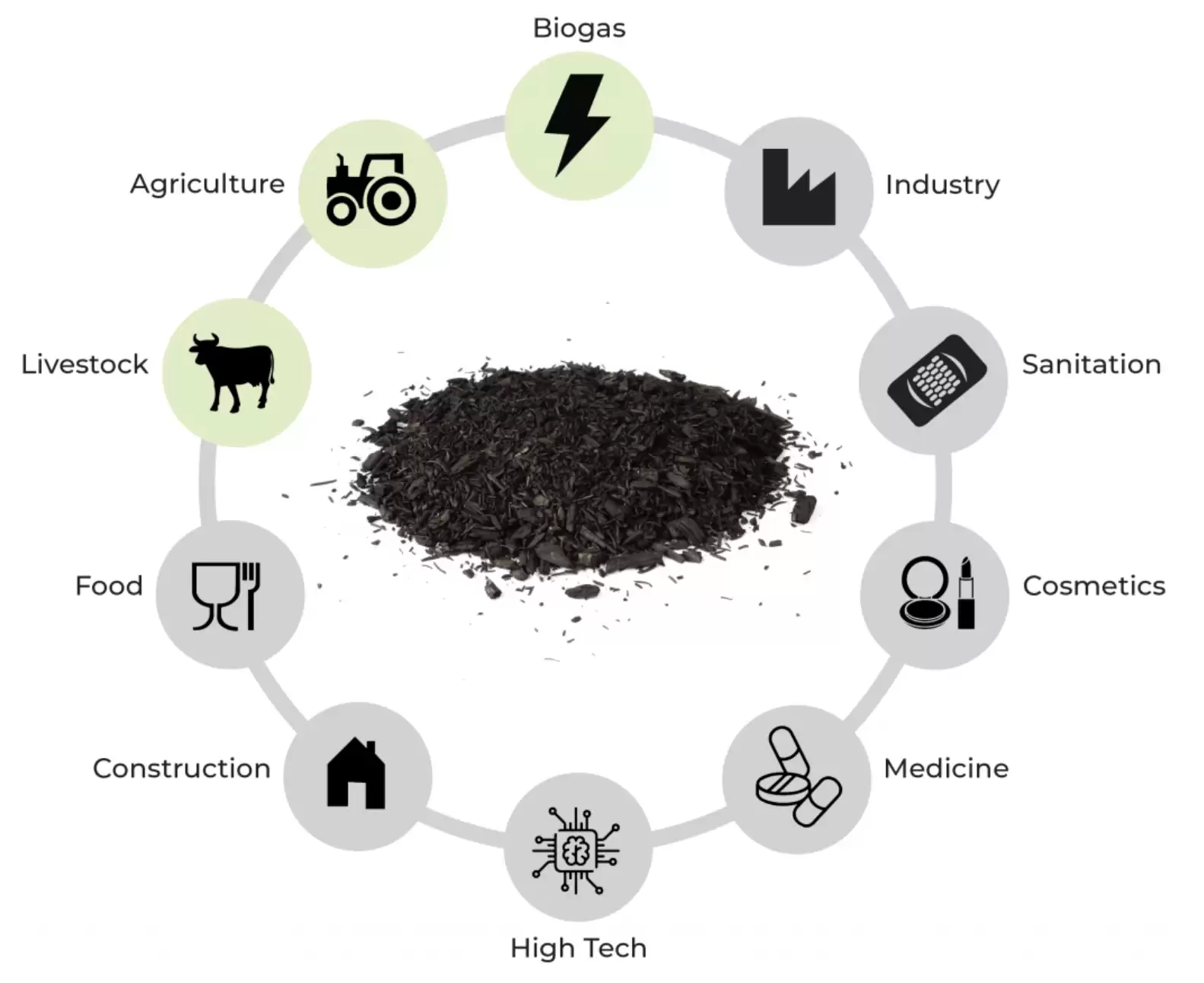What is Biochar?
This article delves into the world of biochar carbon credits, exploring their environmental benefits, production processes, and how they contribute to a greener planet. Biochar is a stable, carbon-rich form of charcoal produced through the process of pyrolysis, where organic materials such as wood, manure, or agricultural waste are heated in a low-oxygen environment. The result is a substance that is rich in carbon and highly resistant to decomposition. Biochar’s structure enables it to retain nutrients and water, thus enhancing soil fertility and increasing agricultural productivity, while also locking carbon away from the atmosphere for hundreds to thousands of years.
The Role of Biochar in Carbon Sequestration
Carbon sequestration is a method used to capture and store atmospheric carbon dioxide (CO2), and biochar is an effective medium for this purpose. The process of creating biochar captures about 50% of the carbon present in the original biomass, which would otherwise be released into the atmosphere as CO2 during decay or combustion. This stored carbon can remain stable in the soil for centuries, making biochar an excellent tool for long-term carbon storage and a vital component in the fight against climate change.
Biochar carbon credits are generated by biochar projects that quantifiably reduce CO2 emissions compared to standard practices. These credits can then be sold and traded on carbon markets, providing a financial incentive for producers and allowing businesses and individuals to offset their carbon footprints.
The Production of Biochar
The production of biochar starts with the sourcing of feedstock—typically organic waste materials. These are then processed in a pyrolysis unit. Pyrolysis involves heating the material at high temperatures (between 300°C and 600°C) in the absence of oxygen. This absence prevents combustion and instead causes the chemical composition of the material to change, resulting in the production of biochar. The quality of biochar can vary significantly based on the type of feedstock used and the conditions of the pyrolysis process.

Environmental Benefits of Biochar
Soil Amendment
Biochar is a powerful soil amendment that brings numerous benefits to agricultural practices:
- Enhanced Fertility: Biochar is rich in carbon and certain nutrients, which can improve soil fertility and increase agricultural yields. Its porous nature allows it to retain nutrients and deliver them slowly to plants, which is particularly beneficial in nutrient-poor soils.
- Improved Structure: Adding biochar to soil can improve its physical structure, enhancing aeration and reducing compaction. This improvement can increase root growth and decrease susceptibility to erosion.
- Moisture Retention: Biochar has a high surface area and porosity, which allows it to retain water and release it slowly over time. This property is especially valuable in arid regions or during periods of drought, making water resources more efficient and resilient.
- Reduced Dependency on Chemical Fertilizers: The nutrient retention capability of biochar reduces the need for chemical fertilizers, which are often costly and can have harmful environmental impacts. By decreasing the leaching of nutrients into groundwater, biochar can also help maintain the chemical balance of soils and reduce the risk of soil acidification.
Waste Reduction
The production of biochar from biomass waste, such as agricultural residues, forestry waste, and even certain types of municipal waste, helps reduce the overall volume of waste. Converting these materials into biochar not only prevents them from decomposing and releasing CO2 and methane into the atmosphere but also offers a productive use for materials that might otherwise contribute to landfill mass and methane emissions. This waste reduction strategy is integral to managing organic waste more efficiently and can play a role in circular economy initiatives.
Water Quality
Biochar has a positive impact on water quality in several ways:
- Reduction of Runoff: By improving soil structure and increasing water retention, biochar can reduce surface runoff, which often carries pesticides, fertilizers, and other pollutants into water bodies. This reduction helps decrease the incidence of water pollution and the eutrophication of lakes and rivers.
- Decreased Soil Leaching: Biochar can adsorb and hold onto harmful chemicals, preventing them from leaching into groundwater or nearby streams and rivers. This characteristic is particularly important in agricultural areas, where pesticide and fertilizer runoff is a major issue.
- Enhancement of Filtration Systems: Biochar can be used in biofiltration systems to clean up wastewater before it is released back into the environment, removing toxins and heavy metals through its adsorptive properties.
Challenges and Considerations
While biochar presents a promising tool for carbon management, its implementation and effectiveness are subject to several challenges and considerations that need to be addressed to fully realize its potential.
Scalability
The scalability of biochar production is crucial for it to make a significant impact on global carbon levels. Currently, biochar production is mostly limited to smaller-scale projects or experimental setups. Scaling this up to an industrial level involves numerous logistical and economic challenges:
- Infrastructure Development: Large-scale production of biochar requires substantial investment in infrastructure, including pyrolysis facilities and transportation systems for both feedstock and the finished product.
- Energy Requirements: The energy needed for pyrolysis could offset some of the carbon savings unless renewable energy sources are used for the heating process.
- Capital Investment: Setting up biochar production facilities requires significant upfront capital, which can be a barrier for new entrants and small-scale operators.
- Regulatory Approval: Scaling up biochar production also involves navigating a complex landscape of environmental regulations and obtaining necessary permits, which can be time-consuming and costly.
Feedstock Source
The sustainability of biochar production largely hinges on the choice of feedstock. While using waste biomass is considered sustainable and beneficial, other sources may not be:
- Sustainability Concerns: Harvesting wood or other types of biomass specifically for biochar production can lead to environmental degradation if not managed responsibly. This includes the risks of deforestation, habitat destruction, and the loss of biodiversity.
- Competition for Resources: Biochar production competes with other biomass uses, such as for bioenergy or as raw materials in industrial processes, which can drive up prices and complicate supply chains.
- Quality and Consistency: Different feedstocks produce biochars with varying qualities and characteristics, which can affect their effectiveness in specific applications. Standardizing quality from diverse feedstock sources is a technical challenge that needs addressing.
Market Volatility
The market for carbon credits, including those generated by biochar projects, is subject to volatility due to various factors:
- Fluctuating Prices: The prices of carbon credits can vary significantly based on supply and demand dynamics, regulatory changes, and economic factors. This volatility can impact the financial viability of biochar projects, making it difficult for producers to predict returns and plan investments.
- Market Confidence: The credibility of carbon credits from biochar projects depends on robust verification and certification processes. Any uncertainty about the effectiveness or environmental integrity of biochar can affect market confidence and credit prices.
- Regulatory Changes: Changes in climate policy can dramatically alter the carbon market landscape. New regulations or carbon pricing schemes can either bolster or undermine the market for biochar credits.
The Future of Biochar in Carbon Markets
As the global economy moves towards more sustainable practices, biochar is likely to play an increasingly important role in carbon offset strategies. International agreements such as the Paris Agreement highlight the need for carbon-neutral and carbon-negative technologies, positioning biochar as a viable solution. For biochar to be fully integrated into carbon markets, clear standards and certifications for biochar carbon credits need to be established to ensure transparency, authenticity, and efficacy in the biochar market.
Conclusion
Biochar represents a multifaceted solution to some of the most pressing environmental challenges of our time, particularly climate change. By converting organic waste into a stable form of carbon storage, improving soil health, and providing a scalable solution to excess biomass, biochar can serve both environmental and economic goals. As the market for carbon credits evolves, biochar is set to become a key player in the global strategy to achieve carbon neutrality.
References
- Eco-Act (n.d.) Biochar: A Carbon Sequestration Tool. Available at: https://eco-act.com/blog/biochar-a-carbon-sequestration-tool/ (Accessed: 8 August 2024).
- Haffner Energy (n.d.) Sequestration du CO2: le Biochar candidat idéal. Available at: https://www.haffner-energy.com/sequestration-du-co2-le-biochar-candidat-ideal-2/ (Accessed: 8 August 2024).
- GECA Environnement (n.d.) Biochar Carbon Credits. Available at: https://gecaenviro.com/biochar-carbon-credits/ (Accessed: 8 August 2024).
- World Economic Forum (2023) Biochar Carbon Removals: Jack of All Trades for Immediate Climate Action. Available at: https://www.weforum.org/agenda/2023/11/biochar-carbon-removals-jack-of-all-trades-for-immediate-climate-action/ (Accessed: 8 August 2024).
- Puro.earth (n.d.) Biochar. Available at: https://puro.earth/biochar (Accessed: 8 August 2024).
- MDPI (n.d.) Biochar: A Sustainable Solution for Carbon Sequestration. Available at: https://www.mdpi.com/2311-5629/9/3/67 (Accessed: 8 August 2024).
- Celignis (n.d.) Biochar Carbon Sequestration. Available at: https://www.celignis.com/biochar-carbon-sequestration.php (Accessed: 8 August 2024).
- MDPI (n.d.) Resources, Conservation and Recycling. Available at: https://www.mdpi.com/2079-9276/13/2/31 (Accessed: 8 August 2024).
- CarbonCredits.com (n.d.) Toucan Launches World’s First Liquid Market for Biochar Carbon Credits. Available at: https://carboncredits.com/toucan-launches-worlds-first-liquid-market-for-biochar-carbon-credits/ (Accessed: 8 August 2024).
About GreenUP
Pioneering the Green Transition with Expertise and Innovation. With over 10 million I-RECs issued since 2019, we are Vietnam’s leaders in renewable energy certification. Our comprehensive suite of services, positions us uniquely as a one-stop solution for all your green and ESG needs. Experience unparalleled market access, competitive pricing, and strategic partnerships that drive not only cost savings but also significant value to your sustainability goals.







